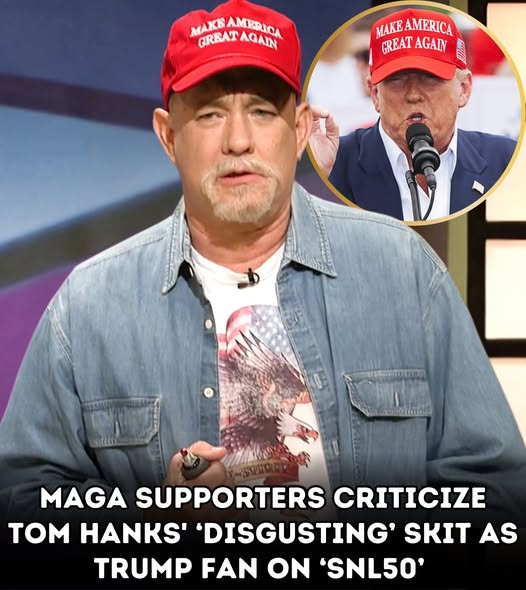
Tom Hanks, renowned for his versatile acting career, recently found himself at the center of controversy following his portrayal of a Trump supporter on “Saturday Night Live” (SNL). During SNL’s 50th anniversary special, Hanks reprised his role as Doug, a character from the “Black Jeopardy!” sketch, which led to significant backlash from MAGA supporters.
The Controversial ‘Black Jeopardy!’ Sketch
In the original 2016 “Black Jeopardy!” sketch, Hanks introduced Doug, a white, MAGA hat-wearing character who surprisingly finds common ground with Black contestants on the game show. The humor stemmed from the unexpected similarities in their perspectives. The recent anniversary special revisited this character, aiming to recapture the satirical essence of the original.
Reprising Doug: A Satirical Intent
Hanks’ return as Doug was intended to satirize and highlight societal stereotypes. The sketch portrayed Doug as hesitant to shake hands with the Black host, Darnell Hayes, played by Kenan Thompson, which was meant to underscore implicit biases. However, this portrayal did not resonate positively with all viewers.
MAGA Supporters’ Reactions
Many Trump supporters perceived the sketch as a direct attack, feeling it perpetuated negative stereotypes about them. Conservative commentator Benny Johnson criticized the portrayal, suggesting it was out of touch with the current political climate. Similarly, right-wing pundit Mario Nawfal described the sketch as “tone deaf,” arguing that it misrepresented the diversity within Trump’s supporter base.
Criticism from Former ‘SNL’ Cast Members
Victoria Jackson, a former “SNL” cast member, also voiced her disapproval. She labeled the sketch “stupid” and questioned why the show targeted Trump supporters while seemingly sparing other political groups. Jackson’s critique highlights a perceived bias in the show’s political satire.
Media Personalities Weigh In
Media figures like Megyn Kelly joined the conversation, expressing disappointment in Hanks’ participation. Kelly suggested that Hanks’ portrayal was a betrayal to his audience, who have long viewed him as an everyman figure. This sentiment reflects a broader discussion about the responsibilities of public figures in political satire.
Joy Behar’s Perspective
Conversely, Joy Behar of “The View” acknowledged the frustration among conservatives, stating that generalizing a large group isn’t fair. Behar’s comments suggest an understanding of the backlash, emphasizing the importance of nuanced portrayals in media.
The Role of Satire in Political Discourse
Satire has historically been a tool to challenge societal norms and political figures. However, its impact depends on audience reception. In this instance, the sketch intended to critique stereotypes but instead reignited debates about media representation and political bias.
SNL’s History of Political Commentary
“SNL” has a long-standing tradition of political satire, often pushing boundaries to provoke thought and discussion. While some sketches are celebrated for their sharp wit, others, like the recent “Black Jeopardy!” segment, highlight the fine line between humor and offense.
Tom Hanks’ Public Image
Known for his roles in films like “Forrest Gump” and “Saving Private Ryan,” Hanks has cultivated an image of relatability and integrity. This recent controversy contrasts with his usual public perception, sparking discussions about the influence of celebrity involvement in political satire.
Impact on ‘SNL’ Viewership
The backlash raises questions about how political content affects “SNL’s” audience engagement. While some viewers appreciate the show’s boldness, others feel alienated, suggesting a potential shift in viewership demographics based on political content.
Social Media Amplification
Platforms like X (formerly Twitter) and Facebook have amplified reactions, with users expressing a wide range of opinions. This digital discourse demonstrates the power of social media in shaping public perception and influencing media narratives.
The Fine Line in Comedy
This incident underscores the challenges comedians face in addressing sensitive topics. Balancing humor with respect requires a nuanced approach, especially in a polarized political environment.
Conclusion
Tom Hanks’ portrayal of a Trump supporter on “SNL” has sparked significant debate about the role of satire, media representation, and political bias. As society continues to navigate these complex issues, it’s essential to foster open dialogues that consider multiple perspectives, ensuring that humor serves as a bridge rather than a barrier.





